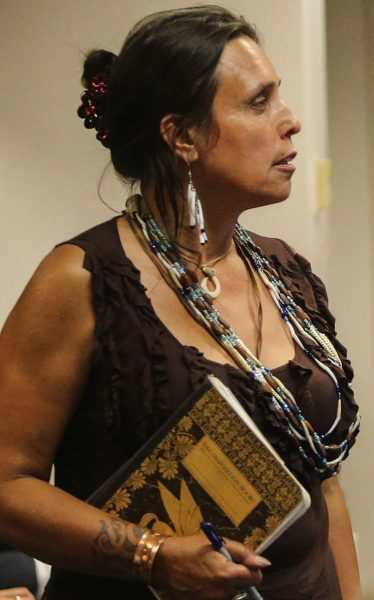
Winona LaDuke is an environmentalist, economist, and writer. Her father was from the Ojibwe White Earth Reservation in Minnesota, and her mother of Jewish European ancestry from the Bronx, New York. LaDuke was born in Los Angeles, California, but raised mostly in Ashland, Oregon, where her mother was an art instructor at Southern Oregon College.
Growing up with her mother in Oregon, LaDuke attended publish school and was on the debate team. While studying at Harvard University, she became part of a larger group of Indian activists. She began making a political name for herself at age 18 when she addressed the United Nations on Indian issues. She graduated in 1982 with a Bachelor of Arts in Economics, concentrating in rural economic development.
LaDuke was an enrolled member of the Ojibwe tribe from an early age, but didn’t live on a reservation until she started work at White Earth after she graduated college. As the principal of the high school, she worked on a graduate degree through the distance-learning program of Antioch University. She completed research for her master’s thesis on the reservation’s subsistence economy and became involved in local issues, earning an M.A. in Community Economic Development. She also has an honorary doctorate degree from Augsburg College.
While working as a principal on the reservation and finishing her graduate degree, LaDuke also was an activist. She helped found the Indigenous Women’s Network, and she worked with Women of All Red Nations to publicize American forced sterilization of Native American women. She became involved in the struggle to recover lands for the Anishinaabe, and founded the White Earth Land Recovery Project in Minnesota with the proceeds of a human rights award from Reebok. LaDuke is also Executive Director of Honor the Earth, an organization she co-founded with the non-Native folk-rock duo, the Indigo Girls in 1993. LaDuke ran as the vice-presidential candidate with Ralph Nader on the Green Party ticket, twice. She was most recently involved in the Dakota Access Pipeline protests.
LaDuke has received many honors for her efforts. She was nominated by Time magazine as one of America’s fifty most promising leaders under forty years of age, given the Thomas Merton Award, granted the BIHA Community Service Award, won the Reebok Human Rights Award, was named Woman of the Year for her work with Honor the Earth by Ms. Magazine, was honored with the Ann Bancroft Award for Women’s Leadership Fellowship, was inducted into the National Women’s Hall of Fame, and received the Alice and Clifford Spendlove Prize in Social Justice, Diplomacy and Tolerance.
And even though it can be easy forgetten in light of all her humanitarian work, LaDuke is also an accomplished author. She’s authored five (fiction, non-fiction, and even a children’s book) and co-authored many other books, as well as having editorials and essays published in national and international media. In possibly her most recent piece, published only a few weeks ago, she made the following plea,
I am tired of being invisible to you all. I am tired of the lack of compassion from a president who slashes health care. I’m tired of the state of Minnesota, which seeks to contaminate the remaining wild rice with sulfide to keep a dying mining industry afloat. And I am tired of North Dakota pretending that Standing Rock does not exist, and balking at a forum on Standing Rock at the University of North Dakota. What I want to say is that we are beautiful, amazing, tough-as-can-be people. It would be nice if we thought of each other kindly and with compassion. I am certainly not too tired to battle, but I would really like us all to do our part, beyond Native American Heritage Month.